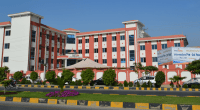Galaxy International School in Uganda educates thinkers, innovators

Date posted: August 18, 2014
Galaxy International School Uganda (GISU) is a co-educational school in Lubowa, 10 kilometres from Kampala, on the Kampala-Entebbe Road. The school now has a new branch in Jinja on the Walukuba/Scott Road near Nile International Hospital. The school provides international education to students between two and 19 years of age using a student-centered curriculum.
Emphasis is on the development of the whole person. Students in years 10 and 11 are prepared for the International General Certificate of Secondary Education (IGCSE) examination and those in years 12 and 13 are prepared for Cambridge A’level examination. These examinations administered by Cambridge International Examinations (CIE) are recognized worldwide.
Ownership
The school is privately owned with a Board of Governors and is managed by a principal. It has qualified and experienced staff from UK, USA, Canada, Europe and East Africa. Galaxy International provides a safe and caring learning environment where students are challenged to make use of their potential and integrate it into a multicultural world community. According to the academic director of Turkish schools, Hakki Aydin, it serves international education with a qualified native and international teaching staff.
Hakki adds that: “A student of Galaxy International School Uganda will develop into a caring, innovative and reflective thinker who will take into consideration environmental protection. “The child will be nurtured to be open minded, knowledgeable, inquisitive and morally upright in order to prepare for the challenging future,” he adds. The school has students from over 50 countries speaking many different native languages.
This enables them to build friendships with peers from many parts of the world. Most of their parents are business people, staff of embassies, United Nations or other international organizations. It also provides students with a wide range of extracurricular and after-school club activities which are done by professional trainers and coaches.
New trends
The growing desire to send local children to international schools is based on their quality of teaching and learning, coupled with the recognition by local wealthy families of the value of an English-medium education. In Uganda, there are about 3,000 students in international schools. In 2000, there were 2,584 international schools in the world teaching about one million students.
Today, that number stands at 5,676 international schools teaching over 2.5 million students, according to research by ISC, an independent organisation dedicated to mapping the world’s international schools and analysing developments in the market.
Boarding section
Galaxy International has started a boarding section, the first of its kind in an international school, which puts it ahead of all the others.
Research has shown that children in boarding school are more independent. Additionally, the educational foundation provided by this intensive form of training provides a springboard to greater opportunities in education. Hakki says a number of parents in Uganda are increasingly seeking schools, which can easily open opportunities for their children in higher education abroad; a reason they send their children to international schools.
International schooling
Galaxy International’s start followed the establishment of a nursery, primary and secondary schools; which as of today have a population of 1,200 students.
Although some international schools employ very few local teachers, in the Turkish schools in Uganda, there are 100 Ugandan teachers, doubling the number of Turkish teachers who are only 50. There are only nine international teachers with 77 non-teaching staff members in the Turkish schools.
Source: New Vision , August 15, 2014
Tags: Africa | Education | Uganda |
























